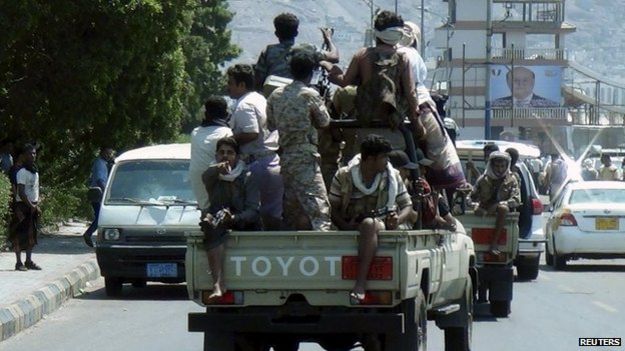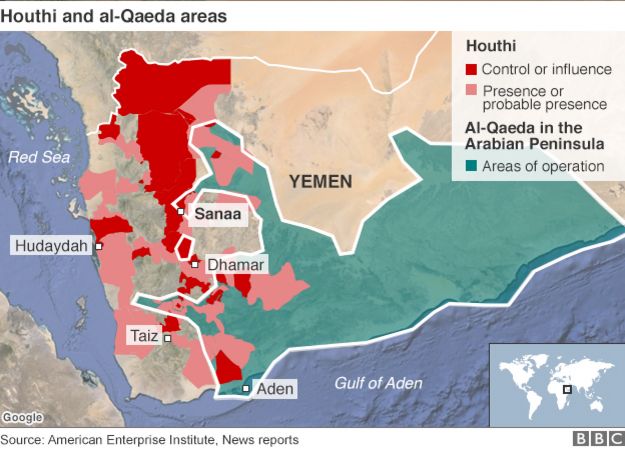Shiite/Sunni Conflict on Another Front
Saudi Arabia on Thursday surprised Yemen with its coalition of Sunni countries finally gathering the resolve to meet the Islamic Republic of Iran at its own game. Saudi warplanes along with those of the Egyptian airforce bombed key military installations in a campaign against the Yemen Houthis whom Iran has supported and urged to take over much of the country, driving out its Sunni president who has now taken shelter in Saudi Arabia. |
| Militiamen loyal to President Abdrabbuh Mansour Hadi have been unable to stop the Houthi advance |
Saudi Arabia and its Sunni allies finally using their combined military strength and the costly weaponry their oil fortunes have assembled, to push back against the hegemonic plans of Iran. Where the combined Sunni Middle East strength was never fully tested as Syria fell into chaotic ruin and Syrian Sunnis in their millions were disenfranchised, Iran has clearly gone an extra step too far on Saudi Arabia's border, with Yemen.
And nor this time around will Saudi Arabia and Egypt be satisfied with mere air attacks, which they continued in the evening on Thursday and on into Friday. Planned ground assaults by Egyptian, Saudi and other forces, once air strikes have sufficiently weakened the rebel capabilities and military forces supporting former president Ali Abdullah Saleh, are to follow. Sanaa and three other provinces have been barraged.
Rebel Houthi leader, Abdul-Malik al-Houthi, took to television to condemn the United States, Saudi Arabia and Israel of a "criminal, unjust, brutal and sinful" campaign targeting the invasion and occupation of Yemen. "Yemenis won't accept such humiliation", he railed, unburdening himself of the opinion of Saudi Arabia as "stupid" and "evil". Sufficiently descriptive words to quantify his rage appear to have failed him.
But stupid and evil will do; it does describe the unseating of a democratically elected president of Yemen.
"[Iran] considers this action a dangerous step. This invasion will bear no result but expansion of terrorism and extremism throughout the whole region", condemned Iranian Foreign Ministry spokeswoman Marzieh Afkham. The United States did contribute in part, with intelligence briefings, but no active part in the attack on Yemen against the Houthis. So here is the U.S., fortifying its traditional relations with Saudi Arabia and in so doing, in active conflict against Iranian interests.
While in Iraq and in Syria, in airstrikes against the Islamic State within their newly-minted caliphate, indirect aid is being given to Iran and to Syria, through U.S. involved airstrikes, enabling Iran to consolidate its control over Syria, Iraq, Lebanon, but being stalled in Yemen. While al-Qaeda in the Arabian Peninsula is also taking advantage of the contorted sectarian conflicts to further its own interests in securing additional towns for itself in Yemen, while attention is directed elsewhere.

Now, the intention is to strike where Houthi leader Abdul-Malik al-Houthi might be found, according to military officials. The al-Sana army camp northeast of Sanaa operated by commanders loyal to former President Saleh have also been targeted. Additional camps outside Sanaa in al-Dhale and Lahj provinces have been struck. The al-Annad base where U.S. military advisers were based was also struck in the absence of those advisers, pulled out last week with deteriorating security concerns.


<< Home